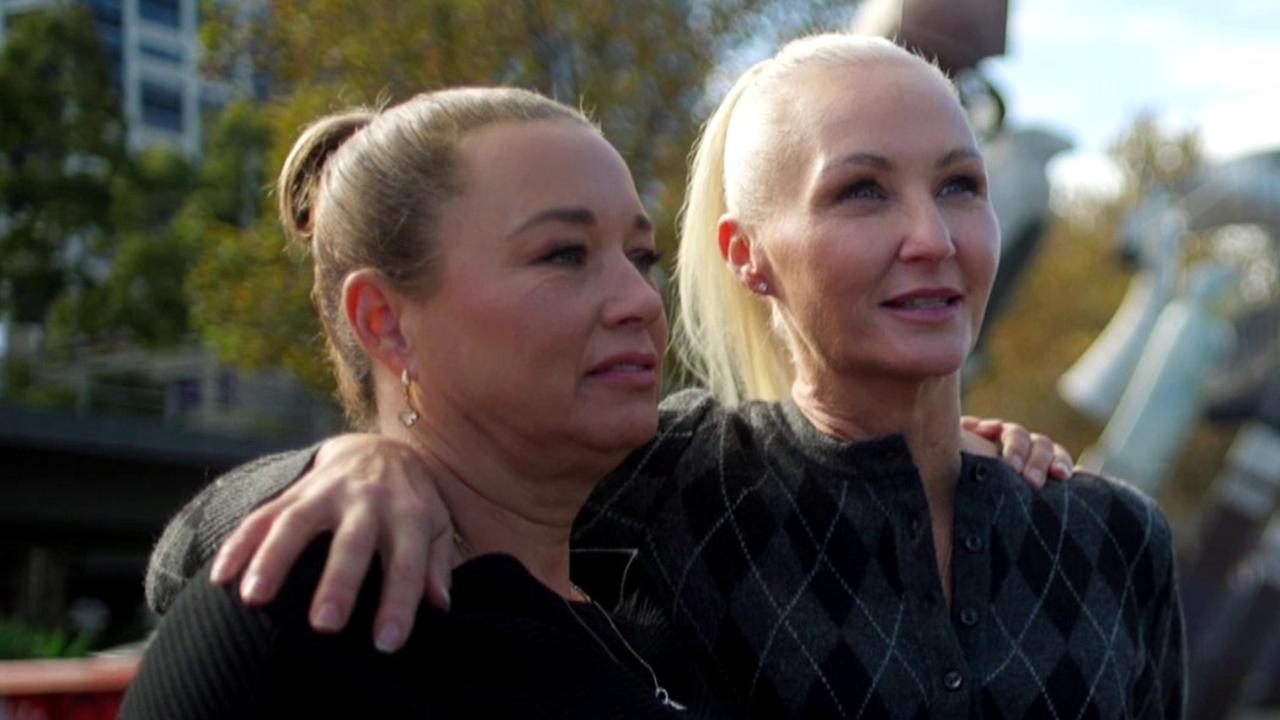Ukraine-Russia war: Fierce fighting continues but Eurovision win lifts spirits in Ukraine
Ukraine’s Eurovision victory gave the country a much-needed boost of morale, as President Volodymr Zelensky warned the war risked triggering global food shortages.
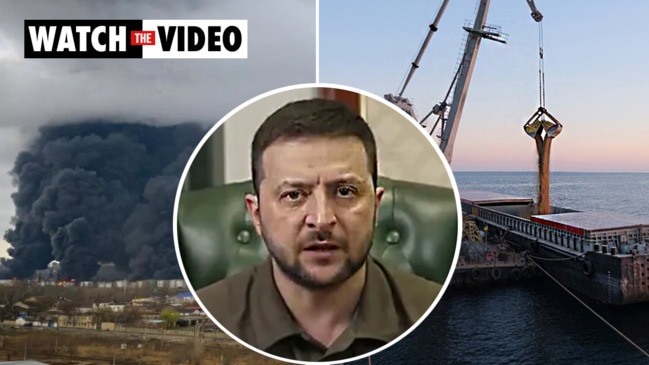
World
Don't miss out on the headlines from World. Followed categories will be added to My News.
Ukraine’s forces were fighting off a fierce Russian onslaught on the east of the country Sunday, after a Eurovision victory gave the country a much-needed boost of morale.
President Volodymr Zelensky warned that the war in his country risked triggering global food shortages, adding that the situation in Ukraine’s Donbas is “very difficult”.
Russia, which invaded Ukraine on February 24, has increasingly turned its attention to the country’s east after failing to take the capital Kyiv.
Western analysts believe President Vladimir Putin has his sights on annexing southern and eastern Ukraine in the months ahead but his troops have appeared to be encountering stiff resistance.
Russia’s war in Ukraine is increasingly shifting the balance of power in Europe, with Finland and Sweden poised to jettison decades of military non-alignment to join NATO as a defence against feared further aggression from Moscow.
Helsinki is set to formally announce its bid for membership on Sunday.
But as a conflict that has displaced millions dragged towards its third month, Ukrainians were offered a much-needed boost of optimism as a rap lullaby combining folk and modern hip-hop rhythms won the Eurovision song contest.
“Stefania”, which beat out a host of over-the-top acts at the quirky annual musical event, was written by frontman Oleh Psiuk as a tribute to his mother before the war — but its nostalgic lyrics have taken on outsized meaning because of the conflict.
“Please help Ukraine and Mariupol! Help Azovstal right now,” Psiuk said in English from the stage, referring to the port city’s underground steelworks where Ukrainian soldiers are surrounded by Russian forces.
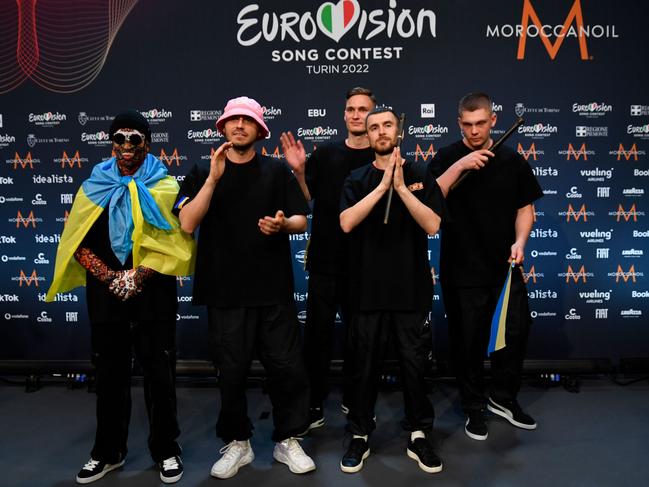
There was also optimism from Kyiv’s head of military intelligence, who told the UK’s Sky News on Saturday that the war could reach a “breaking point” by August and end in defeat for Russia before the end of the year.
Major General Kyrylo Budanov told the news network that he was “optimistic” about the current trajectory of the conflict.
On the ground, the governor of the eastern Lugansk region, Serhiy Gaidai, said Ukrainian forces had prevented Russian attempts to cross a river and encircle the city of Severodonetsk.
“There’s heavy fighting on the border with Donetsk region,” Gaidai said, reporting major Russian losses of equipment and personnel.
“From interceptions (of phone calls), we understand that a whole (Russian) battalion has refused to attack, because they see what’s happening.”
Aerial images showed dozens of destroyed armoured vehicles on the river bank and wrecked pontoon bridges.
UK military intelligence also said Russian forces had sustained heavy losses as they attempted the river crossing.
The highly risky manoeuvre reflected “the pressure the Russian commanders are under to make progress in their operations in eastern Ukraine”, it added.
But Moscow’s forces had “failed to make any significant advances despite concentrating forces in this area”, it said. In Washington, a senior US defence official said most of the activity was now in the Donbas area.
UKRAINE COULD WIN WAR BY END OF THE YEAR
The war in Ukraine could reach a “breaking point” by August and end in defeat for Russia before the end of the year, Kyiv’s head of military intelligence told the UK’s Sky News on Saturday.
Major General Kyrylo Budanov told the news network that he was “optimistic” about the current trajectory of the conflict.
“The breaking point will be in the second part of August,” he said.
“Most of the active combat actions will have finished by the end of this year.
“As a result, we will renew Ukrainian power in all our territories that we have lost including Donbas and the Crimea,” he said.
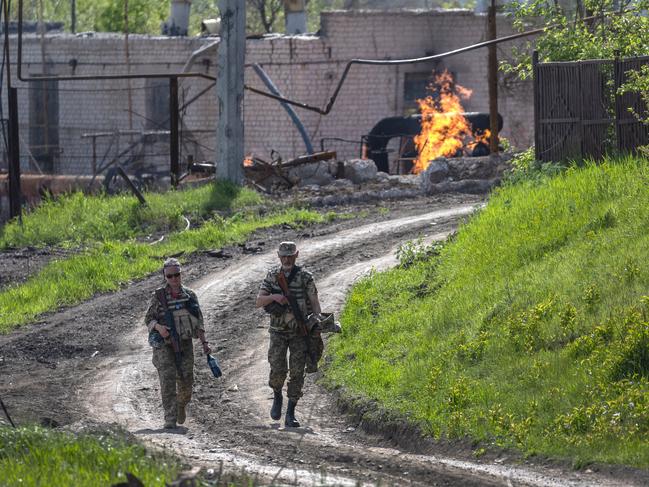
Intense fighting is currently raging in eastern Ukraine’s Donbas region, where Russia has recently been concentrating its forces without making significant progress.
Budanov said that Ukraine knows “everything about our enemy. We know about their plans almost as they’re being made.”
The intelligence chief also made unverified claims that a coup was already under way in Moscow to depose President Vladimir Putin, and that the Russian leader was “very sick” with cancer.
OLIGARCH SAYS PUTIN ‘HAS BLOOD CANCER’
A top oligarch has been secretly recorded saying Vladimir Putin is terminally “ill with blood cancer” as speculation grows over the health of Russia’s president.
It comes as the UK Ministry of Defence confirmed that Ukraine destroyed an entire Russian battalion in a risky river crossing seen as a sign of increasing desperation to make progress in the Donbas.
The audio of the Oligarch with ties to the Kremlin was obtained by New Lines magazine from a recording made Western venture capitalist in mid-March.
The oligarch, verified by New Lines but identified only as “Yuri”, said he believed Putin’s recent displays of frailty were linked to being “very ill with blood cancer”; citing speculation about his limping and back issues.
It also suggested a noticeably puffier face could be the result of steroid-based medication being taken for recovery from the illness.
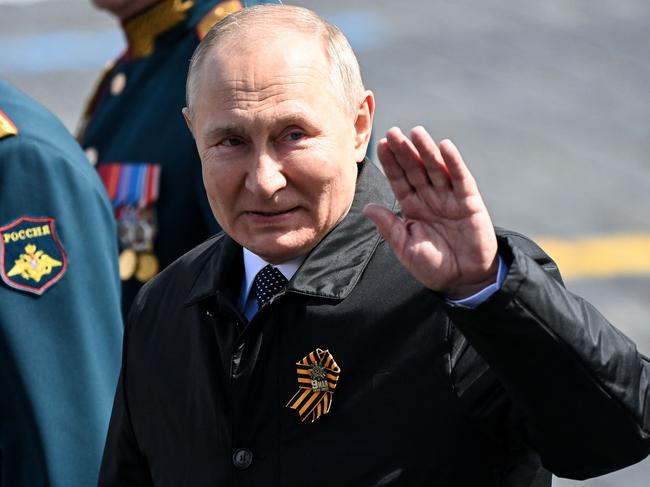
While the type of blood cancer was not specified, the publication said the recordings were the testimony by someone “with proven ties to the Russian government”.
“And the oligarch had no idea he was being recorded,” the report said.
Yuri, who was not currently in Russia, also trashed the Kremlin’s war in Ukraine and its justification to fight Nazis and fascists, adding “we all hope” Putin dies from his cancer.
The recording was made around the time a “top-secret memo” was sent by the FSB headquarters, Russia’s security agency, instructing its regional directors not to trust the suggestions of the president’s terminal condition.
“According to a source at one of the regional units who saw the memo, this unprecedented instruction had the opposite effect, with most FSB officers suddenly coming to believe that Putin indeed suffers from a serious medical condition,” Christo Grozev, the head of investigations at Bellingcat, a forensic research website famous for unmasking Russian spies and assassins, told the publication.
UKRAINE DESTROYS BATALLION IN RISKY RIVER CROSSING
The UK Ministry of Defence confirmed that Ukraine had destroyed an entire battalion trying to make a risky river crossing in the Donbas.
Drone footage released by Ukraine showed several burnt-out tanks and armoured vehicles and a destroyed pontoon partially submerged in the Siverskyi Donets river, west of Severodonetsk.
Ukraine said in a social media post that artillerymen of its 17th tank brigade destroyed the Russian unit. Images showed the destroyed vehicles strewn along a dirt road leading to the river, with the surrounding forest burned to the ground.
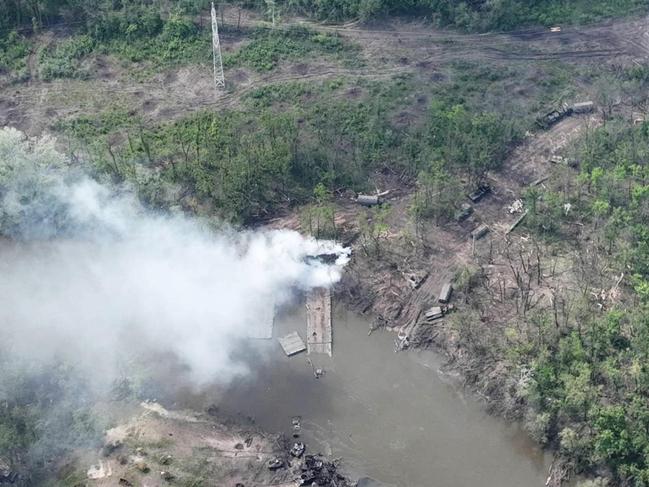
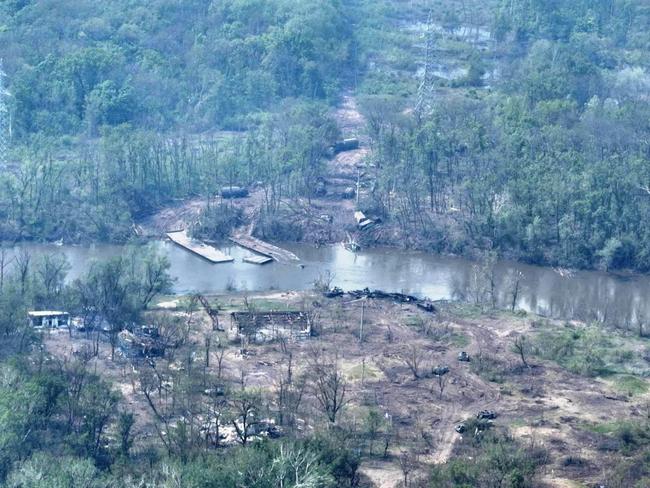
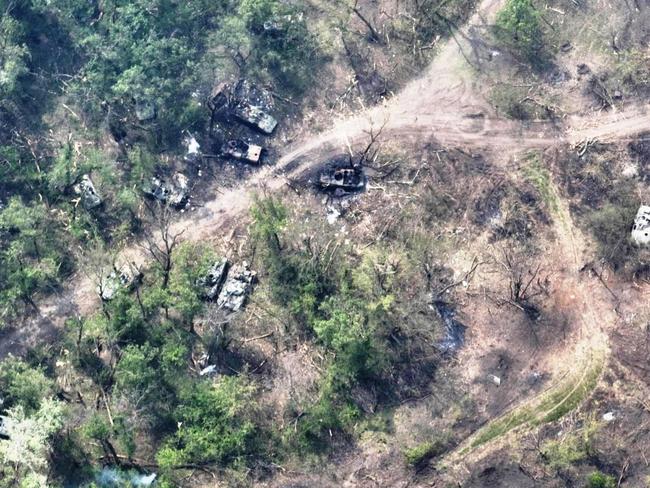
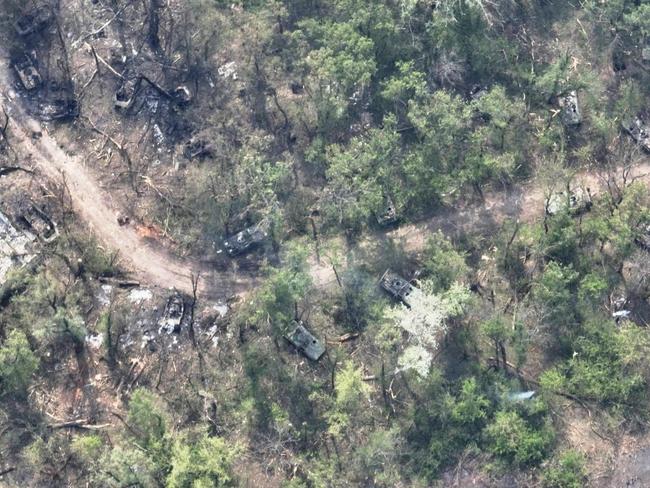
In its latest defence intelligence update on Ukraine, the UK Ministry of Defence said Russia invested a significant effort near Severodonetsk to make a breakthrough towards Sloviansk and Kramatorsk.
“Russia lost significant armoured manoeuvre elements of at least one Battalion Tactical Group as well as the deployed pontoon bridging equipment,” the ministry said.
“Conducting river crossings in a contested environment is a highly risky manoeuvre and speaks to the pressure the Russian commanders are under to make progress in their operations in eastern Ukraine.”
The ministry added that Russian forces failed to make any significant advances despite concentrating forces in the area withdrawing and redeploying units from the Kyiv and Chernihiv Oblasts.
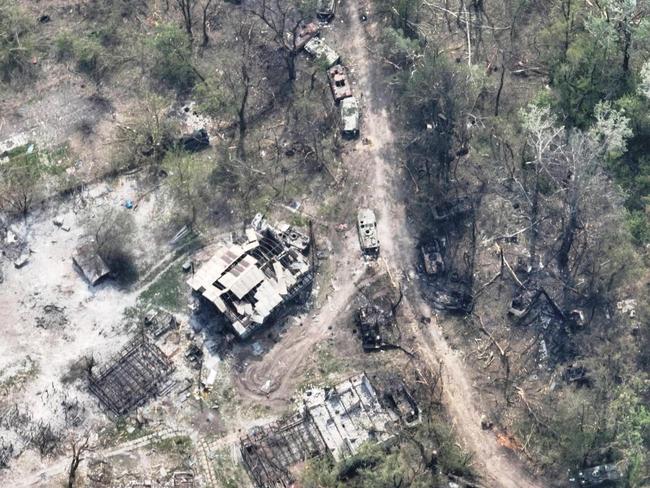
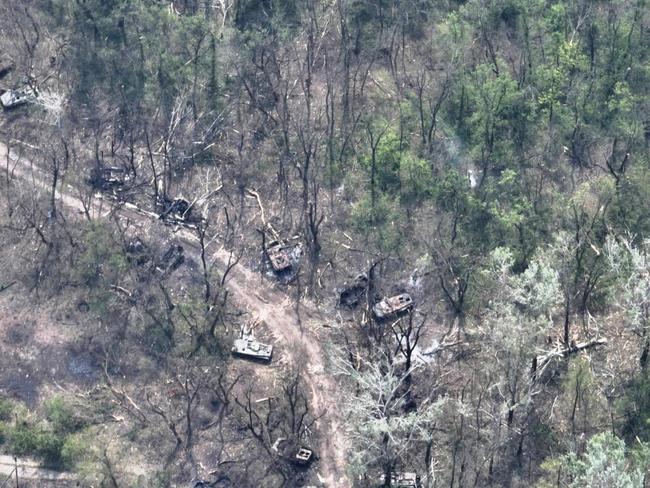
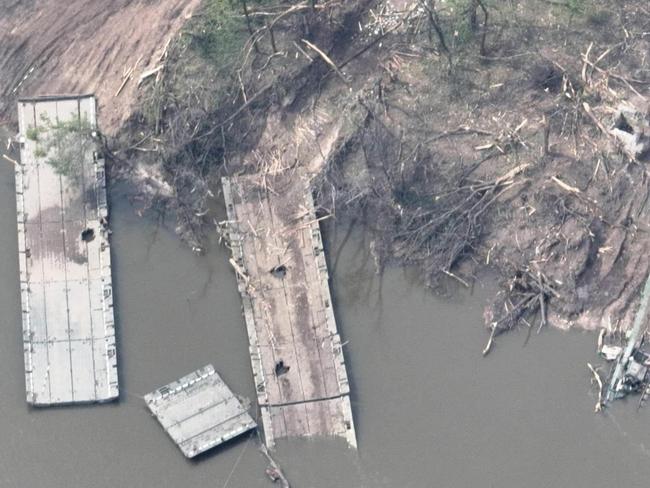
RUSSIAN TANKS ‘BLOWN UP’ IN UKRAINE
Dramatic footage has emerged showing a line of Russian tanks being blown up and engulfed in massive ball of flames, as debris is blown sky-high in front of watching motorists.
In a video shared on Tuesday by Ukraine’s 54th Mechanised Brigade, who are based in the Donbas region, a platoon can be seen getting destroyed — setting the clip to upbeat, patriotic music.
A line of tanks driven by invading troops — whom the unit termed “tourists” — can be seen driving along an unidentified road as smoke from repeated airstrikes fills the sky, according to The New York Post.
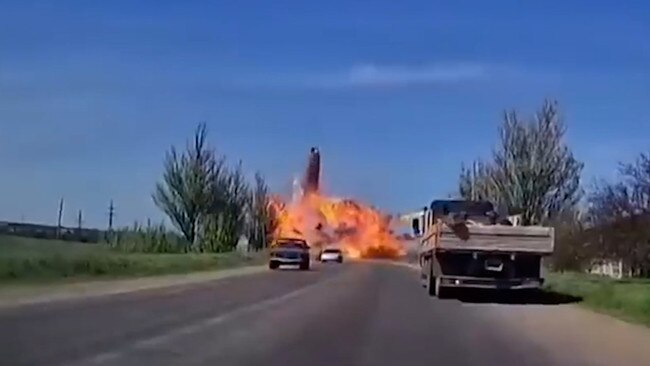
Several of the military vehicles then suffer direct hits, bursting into balls of flame — including one where debris exploded high into the sky.
Similar devastation was caught by Chinese state TV channel Phoenix showing a sudden blast in eastern Ukraine, which saw a Russian tank wiped out instantaneously.
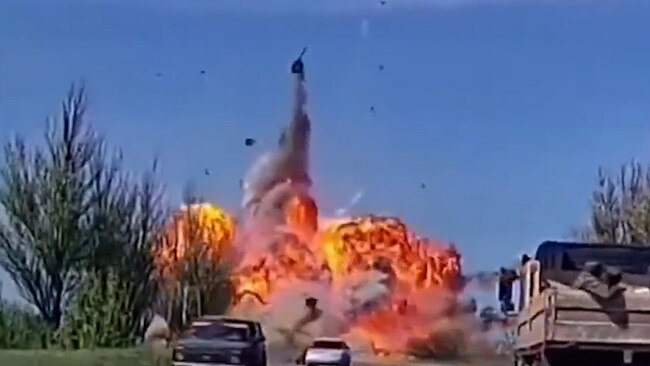
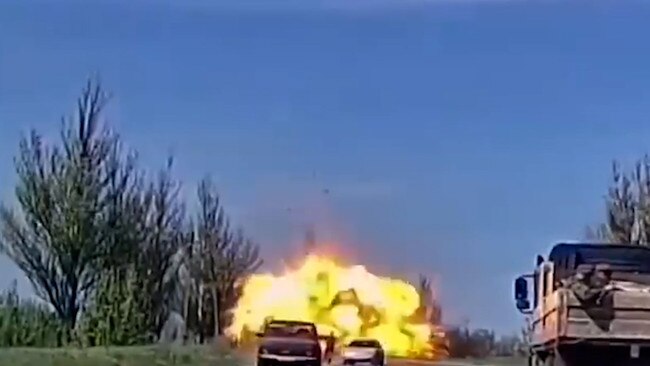
The graphic footage — taken by a Chinese journalist — shows the reporter and his local fixer driving through the city for an interview, before a massive explosion erupts with what looked like a tank turret thrown more than 100 feet into the sky.
According to Phoenix TV, the blast happened last Friday, hitting at least one of two Russian tanks ahead of the reporter — who said he was only saved after a soldier had earlier told him to slow down.
RUSSIA’S NUCLEAR THREAT OVER FINNISH NATO PUSH; ‘Z TANK GRAVEYARD’
Russia’s representative to the United Nations issued a dire nuclear warning to Sweden and Finland over the Nordic countries’ push to join NATO.
The Kremlin warned Finland it would cut off its gas supply as early as Friday after the country – which shares a border with Russia – signalled it would join the NATO military alliance.
New York-based Dmitriy Polyanskiy, Russia’s First Deputy Permanent Representative to the UN, said the move makes legitimate strike targets out of Finland and Sweden, which has also indicated its intention to join NATO.
“They know that the moment they become members of NATO it will imply certain mirror moves on the Russian side,” he said in an interview with UnHerd.
“It means that there are NATO detachments in these territories, these territories would become a target, a possible target for a strike.”
Mr Polyanskiy said that despite living as good neighbours for decades, joining the “unfriendly bloc” puts them in the crosshairs of defence and economic risks, including the possibility of nuclear retaliation.
“It means that Finland and Sweden all of a sudden, instead of neutral countries, become part of the enemy,” Mr Polyanskiy continued. “Of course, we will have to take certain moves,” he added.
Pressed by UnHerd host Freddie Sayers if Russia could use nuclear weapons as a result of the conflict in Ukraine, Mr Polyanskiy said the so-called “special military operation” in the Donbas had become a proxy war for NATO.
“If you deal with a nuclear state, if you threaten a military state, you should count on all the options that are on the table,” he said.
“Yes, we possess nuclear weapons. Yes if there is an existential threat to Russia then I’m simply sure that we can use nuclear weapons if it’s about survival.”
He added that it was up to Russian President Vladimir Putin, as commander in chief, to decide whether to take that course of action.
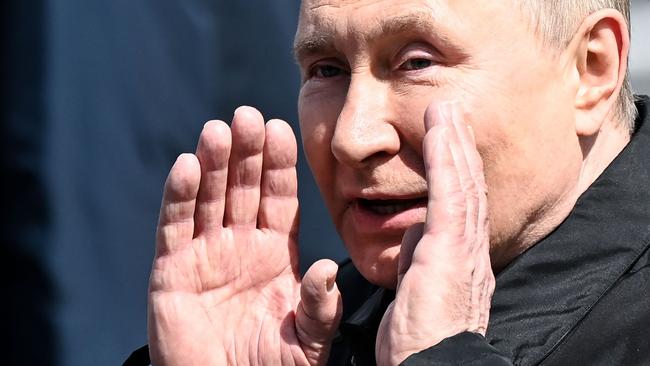
“Again, if you are threatening a nuclear power I think you should calculate all the risks. That’s very easy,” he said.
The chilling nuclear warning comes after Russia’s foreign ministry said Finland’s “radical change” in foreign policy would lead to the economic “retaliatory measures” of withholding Russian oil.
Finnish newspaper Iltalehti, citing unnamed sources, reported that the plan was triggered in response to Finland’s president and prime minister announcing they would apply for NATO membership “without delay”.
‘Z-TANK GRAVEYARD’ DISCOVERED
Ukraine’s defence has shared photos that purport to show a Russian Z tank graveyard with reportedly 52 vehicles blown up by troops in a single battle.
The Russian battalion was bombed trying to cross the river Donets in Ukraine, according to Kyiv.
“Artillerymen of the 17th tank brigade of the #UAarmy have opened the holiday season for ruscists. Some bathed in the Siverskyi Donets River, and some were burned by the May sun,” Defence if Ukraine tweeted on Thursday.
It comes as Russian troops were pushed away from Ukraine’s second city Kharkiv.
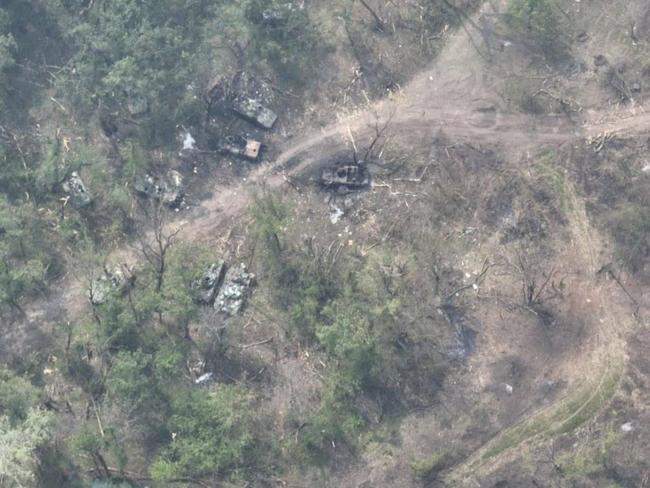
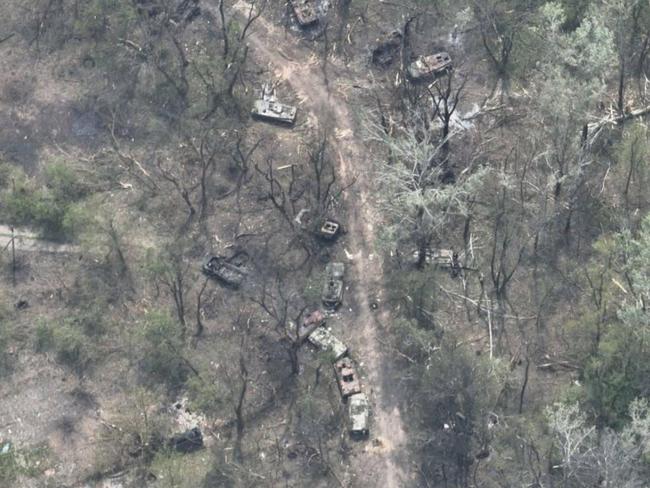
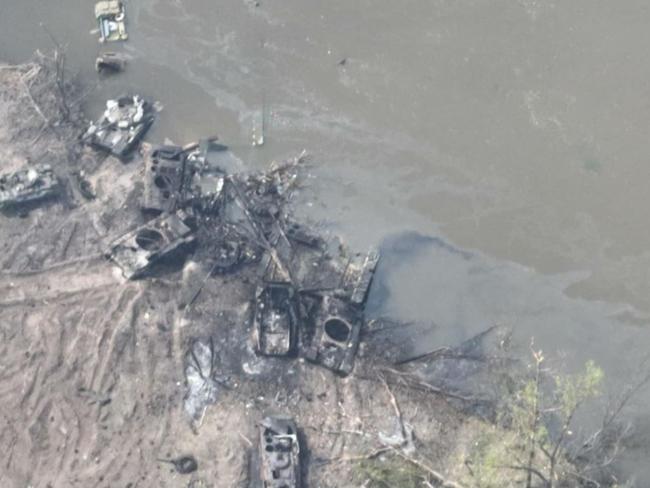
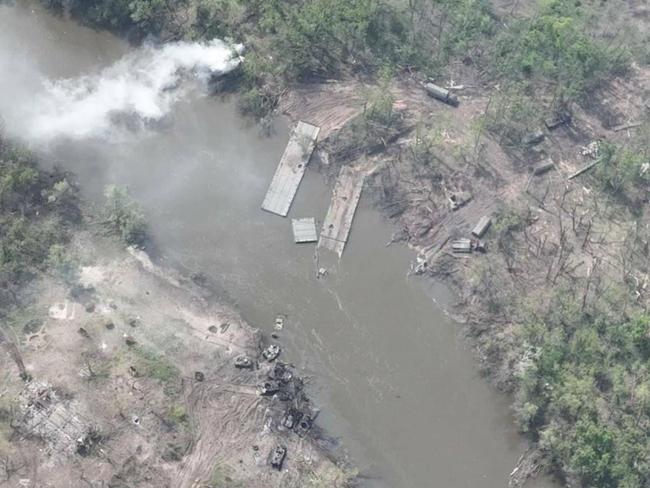
FINLAND DECIDES ON NATO MEMBERSHIP
Finland’s president and prime minister said they were in favour of joining NATO and a formal decision would be taken this weekend, after Russia’s war in Ukraine sparked a swift U-turn in opinion.
“Finland must apply for NATO membership without delay,” President Sauli Niinisto and Prime Minister Sanna Marin said in a joint statement.
Mr Niinisto has often served as a mediator between Russia and the West.
“NATO membership would strengthen Finland’s security. As a member of NATO, Finland would strengthen the entire defence alliance,” the statement said.
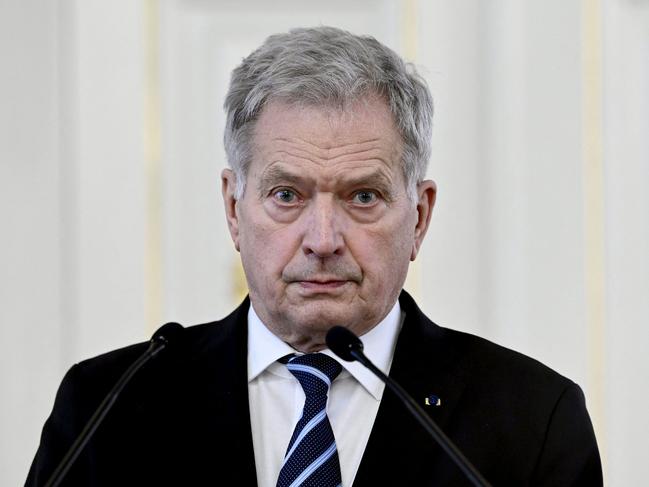
A special committee will announce Finland’s formal decision on a membership bid on Sunday, the statement added.
The two leaders had been widely expected to come out in favour of joining the Western military alliance.
“Joining NATO would not be against anyone,” Mr Niinisto told reporters, amid Russian warnings of consequences if Helsinki were to seek membership.
His response to Russia would be: “You caused this. Look in the mirror,” he said.
As recently as January, amid tensions between the West and Russia, Ms Marin said a bid would be “very unlikely” during her current mandate, which ends in April 2023.
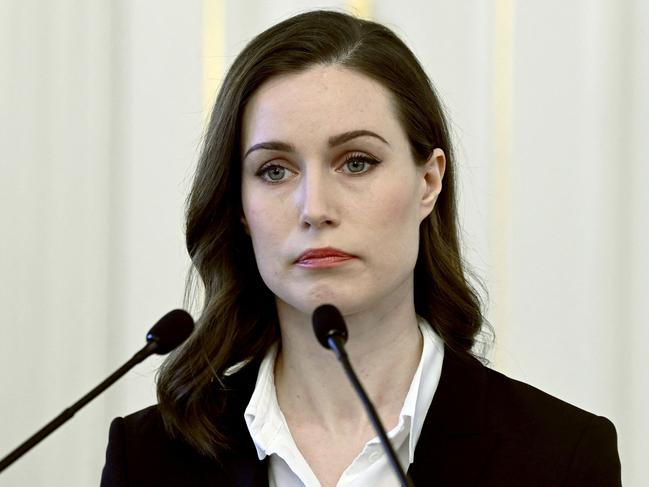
But after its powerful eastern neighbour invaded Ukraine on February 24, Finland’s political and public opinion swung dramatically in favour of membership as a deterrent against Russian aggression.
A poll published on Monday by public broadcaster Yle showed that a record 76 per cent of Finns now support joining the alliance, up from the steady 20-30 per cent registered in recent years.
Finland shares a 1300km border with Russia and has been militarily non-aligned for decades.
In 1939, it was invaded by the Soviet Union.
Finns put up a fierce fight during the Winter War but were ultimately forced to cede a huge stretch of its eastern Karelia province in a peace treaty with Moscow.
EU’S CHILLING WARNING TO THE WORLD
Top European officials have warned that Russia poses the “most direct threat” to world order and urged China to play a more constructive role on the international stage as they held talks in Tokyo.
European Commission President Ursula von der Leyen and European Council President Charles Michel are in Japan for talks that have touched on Russia’s invasion of Ukraine but also growing concerns about China’s role in Asia and beyond.

Russia “is today the most direct threat to the world order with the barbaric war against Ukraine, and its worrying pact with China,” Ms Von der Leyen said after talks with Japanese Prime Minister Fumio Kishida on Thursday.
The annual summit comes with much of the international community rallying to pressure Moscow over Ukraine.
“Russia’s invasion of Ukraine is not just a matter for Europe, but it shakes the core of the international order including Asia. This must not be tolerated,” said Mr Kishida, whose government has joined tough sanctions on Moscow, including on energy.
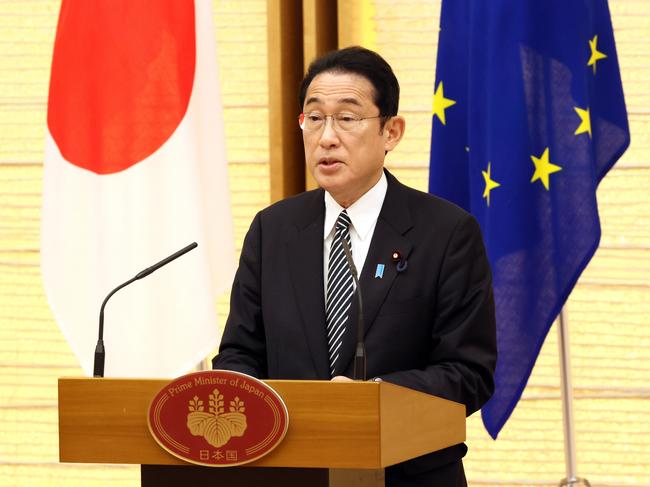
Beijing’s increasingly muscular stance in Asia was also on the agenda, with the EU looking to take a more high-profile role in confronting China.
“Our co-operation in Ukraine is critical in Europe, but it’s also important in the Indo-Pacific and we also want to deepen our consultation on a more assertive China,” said Mr Michel.
“China must stand up to defend the multilateral system that it has benefited from in developing its country.”
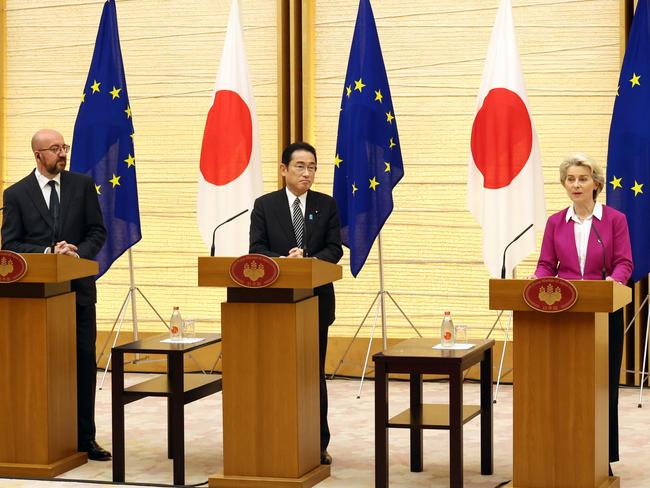
Ms Von der Leyen said the EU and Japan were stepping up co-operation including launching a digital partnership that will focus on competitiveness and security.
She said the two sides would also work on supply chains, which have been disrupted by the pandemic and the war in Ukraine, but are also the subject of worry about China’s role in chip production.
“There are materials and technologies that have become essential to our economy and everyday lives, like semiconductors for example. We must be able to count on trustworthy supply chains,” she said.
KYIV STARTS WAR TRIAL
Ukraine announced it will hold its first war crimes trial over the Russian invasion, as Moscow accused Kyiv of shelling a Russian city in the war’s latest flashpoint.
Kyiv has repeatedly accused Russian troops of committing atrocities since the invasion began on February 24, and Ukrainian authorities said they would launch the first war crimes trial of the conflict.
The prosecutor general’s office said Vadim Shishimarin, a 21-year-old Russian service member, is accused of killing an unarmed 62-year-old civilian as he fled with four other soldiers in a stolen car.
“The man died on the spot just a few dozen metres from his home,” said a statement from prosecutor Iryna Venediktova’s office.
Mr Shishimarin faces possible life imprisonment if found guilty.
Mr Venediktova’s office has said it has received reports of more than 10,000 alleged war crimes, with 622 suspects identified.
The Russian invasion has sparked an exodus of nearly six million civilians, many of whom bear accounts of torture, sexual violence and indiscriminate destruction.
The UN Human Rights Council was due to hold a special session on Ukraine on Thursday.
It comes as three people were killed and 12 others wounded in a Russian strike on a town in Ukraine’s northern Chernigiv region on Wednesday local time, the emergency services told AFP.
“We have three people killed and 12 wounded as a result of a strike” in Novgorod-Siversky, a spokesman said.
Meanwhile, in the Russian city of Belgorod, around 70km from Kharkiv, authorities said one person was killed and six injured by Ukrainian shelling.
Belgorod governor Vyacheslav Gladkov said it was “the most difficult situation” facing the border region since Russia sent its troops into Ukraine 11 weeks ago.
Authorities in Russian regions bordering Ukraine have repeatedly accused Ukrainian forces of launching attacks.
In April, Gladkov said Ukrainian helicopters carried out a strike on a fuel storage facility in Belgorod.
‘PUSHED AWAY’: PUTIN’S BLOW IN UKRAINE
Russian troops are being pushed away from Ukraine’s second city Kharkiv, President Volodymyr Zelenskyy confirmed, but he sounded a note of caution as Russian dictator Vladimir Putin “won’t stop” and is ready for a long war.
It came after US President Joe Biden warned that Ukraine would likely run out of funds to keep fighting within days, as the US House of Representatives voted to send a $US40 billion aid package to the country.
In his nightly address, Mr Zelenskyy said he had “good news” from the northeastern Kharkiv region.
“The occupiers are gradually being pushed away,” Mr Zelenskyy said.
“I am grateful to all our defenders who are holding the line and demonstrating truly superhuman strength to drive out the army of invaders.”
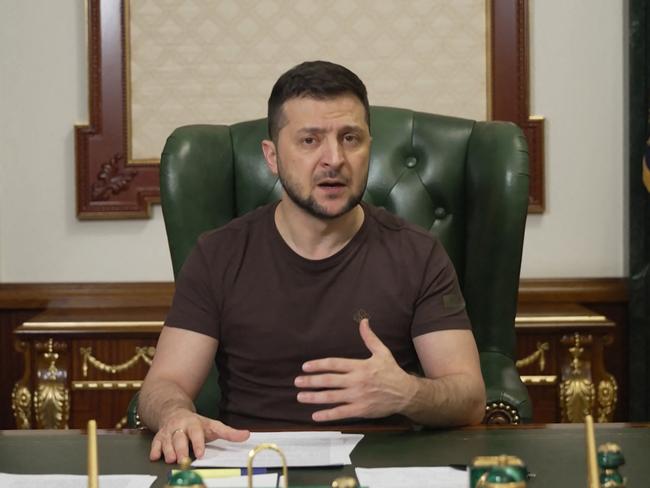
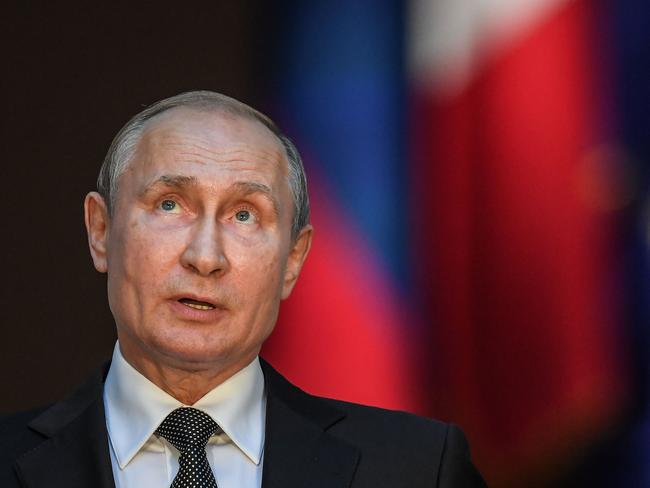
The head of the Kharkiv regional state administration Oleg Synegubov said on Telegram that “fierce battles” were ongoing in the region, and that the city itself was under heavy fire.
“Due to successful offensive operations, our defenders liberated Cherkasy Tyshky, Rusky Tyshky, Rubizhne and Bayrak from the invaders,” he said.
“Thus, the enemy was driven even further from Kharkiv, and the occupiers had even less opportunity to fire on the regional centre.”
Despite the apparent headway made, Mr Zelenskyy urged Ukrainians not to “create an atmosphere of specific moral pressure, when certain victories are expected weekly and even daily”, a reflection of the intense pressure being exerted by Russia on its neighbour.
A stark example of that could be seen in the Kharkiv region itself, where Synegubov announced that 44 civilian bodies had been found under the rubble of a destroyed building in the eastern town of Izyum, now under Russian control.
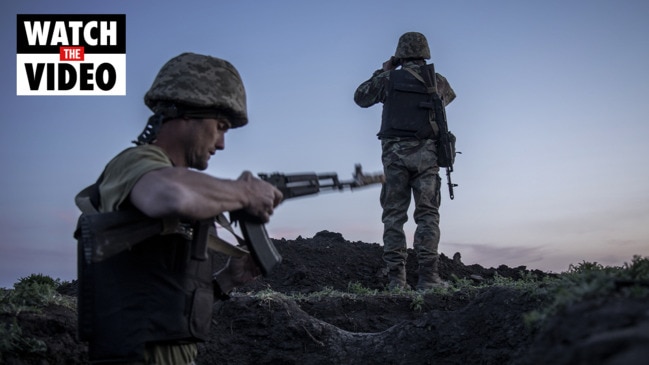
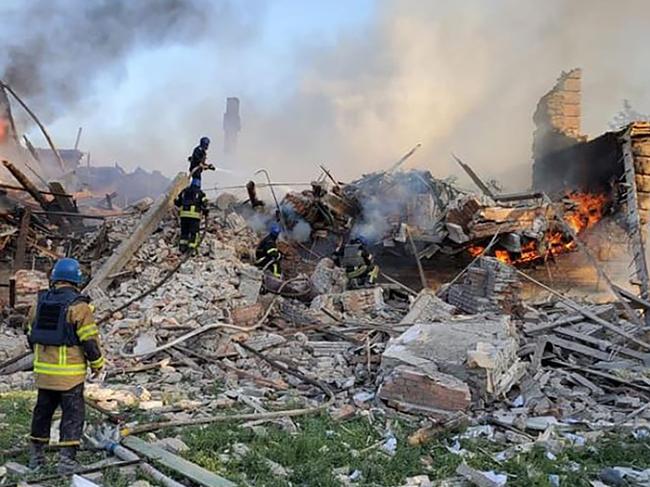
‘PRAY FOR US’
A group of Ukrainian soldiers’ wives and anti-Kremlin activist Pyotr Verzilov met with Pope Francis at the Vatican and asked him to intervene to “save the lives” of their loved ones battling Russian forces at Mariupol’s Azovstal steel plant.
“We asked him to come to Ukraine, to talk to (Russian President Vladimir) Putin, to tell him ‘Let them go’. He just said he would pray for us,” Kateryna Prokopenko told reporters after the brief encounter on Wednesday.
Her husband, Denis Prokopenko, is one of the leaders of the Azov regiment, a former far-right battalion turned National Guard unit who are leading the defence of the Azovstal steelworks in the southern Ukrainian port city of Mariupol.
The Ukrainians at the plant are the last pocket of resistance against the Russians, who now control Mariupol after weeks of siege.
“We hope that this meeting will just give us the chance to save their lives. We are ready for the actions of the pope, from his delegation, our soldiers are ready to be evacuated to a third country,” Prokopenko said.
The women said their meeting with Pope Francis lasted around five minutes and took place after his weekly general audience on St Peter’s Square.
Also in attendance was Verzilov, an associate of the punk group Pussy Riot and also publisher of Mediazona, an independent online publication which writes about court cases and abuses of prisoners’ rights, among other subjects.
Yulia Fedosiuk, another member of the group of Ukrainian soldiers’ wives, said they told the pope that “700 of our soldiers are injured, they have gangrene, amputations”.
“Many of them are dead, we couldn’t bury them, we asked the pope to help them, to be a third party in this war and to let them go through the (humanitarian) corridor,” she said.
“He told us that he prays for us and that he is doing everything” he can. She added that at the steelworks, “conditions are terrible there, no food, no water, no medical conditions – the last hospital was destroyed by Russian bombs – many dead soldiers”.
Kyiv said on Tuesday that more than 1,000 of its troops, many of them injured, remained in the sprawling Azovstal plant, many sheltering in the labyrinth of Soviet-era bunkers and tunnels underground.
At the weekend, Deputy Prime Minister Iryna Vereshchuk said all women, children and elderly people had been evacuated from Azovstal as part of a humanitarian mission co-ordinated by the United Nations and the Red Cross.
US WARNS OF PUTIN’S GRAND PLAN
Mr Putin will expand the Ukraine war beyond the Donbas region and is determined to build a land bridge to Transnistria in Moldova, the US Director of National Intelligence Avril Haines has warned.
“We assess President Putin is preparing for prolonged conflict in Ukraine during which he still intends to achieve goals beyond the Donbas,” Dr Haines told a Senate hearing on Tuesday.
“Putin most likely also judges that Russia has a greater ability and willingness to endure challenges than his adversaries, and he is probably counting on US and EU resolve to weaken as food shortages, inflation and energy prices get worse,”
Fears that Transnistria – the tiny former Soviet republic of Moldova – could be sucked into the conflict in neighbouring Ukraine have been mounting following several explosions in the breakaway Moscow-backed region.
The warning from US intelligence officials comes as Russian forces intensified their fight in Ukraine’s east and fired missiles over the port city of Odessa.
The southern city was hit by a series of missiles Monday, destroying buildings, setting ablaze a shopping centre and killing one person, its city council said, just hours after a visit by European Council President Charles Michel.
As Russia stepped up its fight to seize Ukraine’s east, US President Joe Biden resurrected a World War II measure to aid Kyiv, opening the spigots on artillery, anti-aircraft missiles, antitank weapons and other powerful Western materiel.
The United States has sent some $4 billion in military aid to Ukraine already but “caving to aggression is even more costly,” Mr Biden said as he signed the act, passed with unusual bipartisan support.
Missiles earlier rumbled through Moscow’s Red Square as Mr Putin sought to channel national pride on the anniversary of the defeat of Nazi Germany into support for a war that has killed thousands and sent millions into exile.
On the ground in Ukraine, the governor of Lugansk reported “very serious battles” in the frontline areas of Bilogorivka and Rubizhne.

An AFP team reported seeing columns of trucks filled with soldiers and heavy equipment move down the main road leading away from the city of Severodonetsk – one of its last eastern strongholds against Russia – suggesting Ukraine was pulling back from some parts of the front.
In the devastated southern port of Mariupol, pro-Russian separatists feted Victory Day, with leader Denis Pushilin and residents carried a giant black and orange ribbon of Saint George – a symbol of WWII celebrations in Russia – through a city that has seen some of the heaviest fighting since the invasion on February 24.
Full control of Mariupol would allow Moscow to create a land bridge between the Crimean peninsula, which it annexed in 2014, and eastern regions run by pro-Russian separatists.
Some have speculated that Putin was seeking to achieve that goal in time for Victory Day, but a small contingent of depleted Ukrainian forces continued their defence of a final bastion at the Azovstal steelworks.
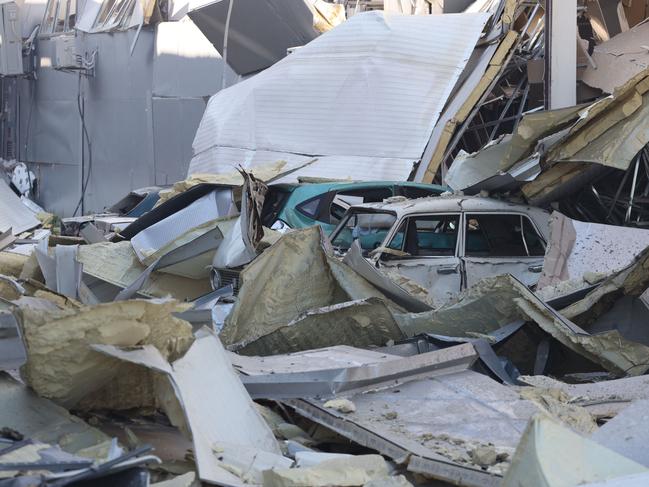
‘I BOW TO PUTIN’
In his speech in Moscow, the Russian leader blamed the West and Ukraine for the two-and-a-half-month conflict, telling the parade that his country faced an “absolutely unacceptable threat” and warning against the “horror of a global war”.
“You are fighting for the Motherland, for its future, so that no one forgets the lessons of the Second World War,” he said.
The celebration in Red Square also featured some 11,000 troops and more than 130 military vehicles, although a planned military fly-past was cancelled.
“Putin conducts politics so well, well done to him. He makes sure that our boys don’t die, that there is as little blood as possible. I bow down to him,” added Taisiya Chepurina, 81, whose husband fought in the Battle of Stalingrad in 1943.
But Ukrainians and Western powers accused Putin of exploiting the anniversary, with protesters in Warsaw tossing blood-red paint on the Russian ambassador, chanting “fascists!” and hoisting a Ukrainian flag, as he visited a cemetery.
Ukrainian leader Volodymyr Zelenskyy also invoked the ghosts of WWII, chiding Russia for claiming sole credit for winning.
“We will not allow anyone to annex this victory. We will not allow it to be appropriated,” he said in a video speech shortly before Mr Putin spoke.
In Kyiv the commemoration day was largely shunned as life slowly returned to normal, weeks after fierce fighting raged in its suburbs.
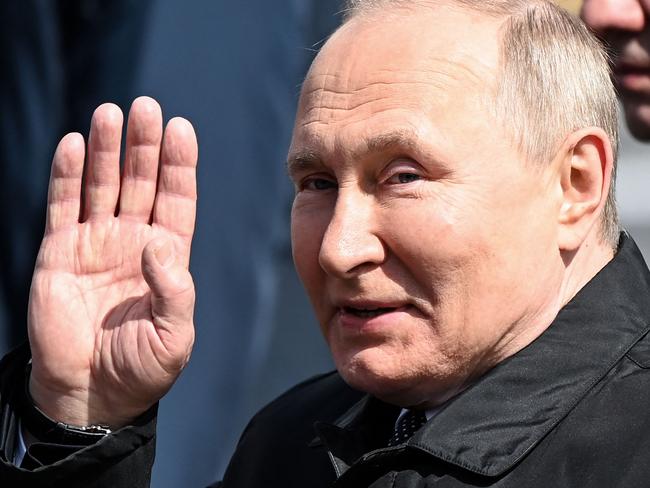
CAMPS IN THE EAST?
Still facing the brunt of the fighting are Ukraine’s civilians, with the country reeling from a Russian attack on a school over the weekend that killed 60 people.
And the Pentagon said Monday it has seen indications that those caught up in Russia’s invasion are being forcibly removed from their homeland.
“I can’t speak to how many camps or what they look like,” Pentagon spokesman John Kirby told reporters when asked about statements from Kyiv that some 1.2 million Ukrainians were being sent across the border and placed in camps.
“But we do have indications that Ukrainians are being taken against their will into Russia,” Mr Kirby said.
He called these actions “unconscionable” and “not the behaviour of a responsible power.”
The deportation of Ukrainians from their own nation – often to isolated or economically depressed regions of Russia, according to Kyiv – is another indication that Putin “simply won’t accept and respect Ukrainian sovereignty,” he added.
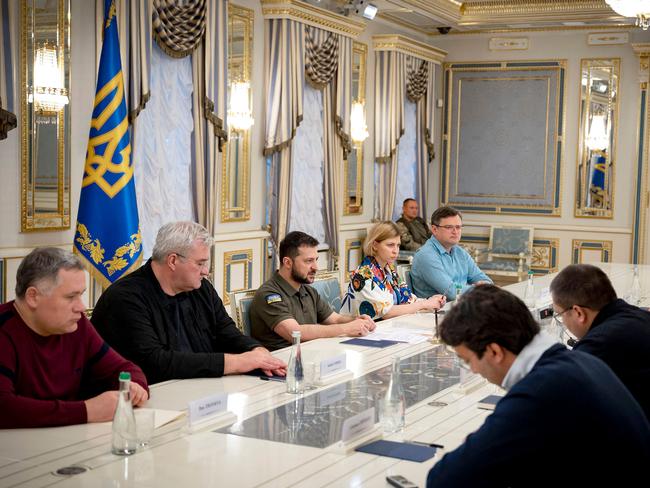
PROGRESS TOWARDS EMBARGO
In another step forward in building pressure on Russia, EU chief Ursula von der Leyen said she made “progress” on a proposed Russian oil embargo during talks with Hungarian Prime Minister Viktor Orban.
The populist Orban is one of Mr Putin’s closest friends in Europe and had held up the bloc’s attempt to phase out Russian oil – one of the most painful measures yet taken by the West – as he pointed to economic consequences in landlocked Hungary.
But France’s President Emmanuel Macron poured cold water on Ukraine’s oft-repeated desire for fast-track European Union membership, saying it would take “decades”.
Mr Macron, however, suggested building a broader political bloc that could also include Britain.
One ray of hope has come from prisoner swaps.
Ukrainian soldier Glib Stryzhko, 25, was gravely wounded and captured in Mariupol in April but finally released after a secret phone call to his mother.
“After we were loaded onto the bus waiting for us, the driver said: ‘Guys, you can breathe. You are home now’,” Mr Stryzhko told AFP from his hospital bed in Zaporizhzhia.
More Coverage
Originally published as Ukraine-Russia war: Fierce fighting continues but Eurovision win lifts spirits in Ukraine
Read related topics:Russia & Ukraine Conflict




